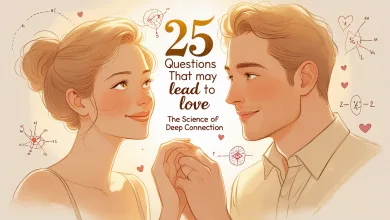Why You Can’t Attract Him? 7 Psychological Barriers Holding You Back

Ever wondered why some women seem to effortlessly attract amazing partners while you’re stuck in an endless cycle of disappointing dates? The answer might lie deeper than you think. Let’s explore the psychological barriers that could be blocking your path to a fulfilling relationship.
The Invisible Walls Between You and Him
Have you ever felt like there’s an invisible force field preventing you from connecting with men you’re interested in? You’re not alone. Countless women struggle with this exact challenge, and contrary to what those cheesy dating guides tell you, it’s not about wearing the right perfume or mastering some magical text message formula.
The truth is, attraction operates on multiple levels of consciousness, with psychological factors playing a much more significant role than most people realize. According to research published in the Journal of Personality and Social Psychology, our attachment styles formed in early childhood can dramatically influence our adult romantic relationships. These patterns run deep, affecting everything from who we’re drawn to, to how we communicate our interest.
7 Psychological Blocks Preventing You From Attracting Him
1. The Shadow of Past Relationships
We’ve all been there—carrying the emotional baggage from previous relationships into new ones. But did you know that these lingering feelings can actively repel potential partners?
When you’re still processing heartbreak or betrayal, you unconsciously broadcast these unresolved emotions. Men can sense this emotional unavailability, even if you think you’re hiding it well. A study from the University of Toronto found that people who haven’t properly healed from past relationships tend to project their fears onto new partners, creating a self-fulfilling prophecy of rejection.
The healing journey isn’t optional—it’s essential. Taking time to process your feelings, perhaps with the help of a therapist, can clear these emotional roadblocks. Journaling about your past relationship patterns or joining support groups can also help you recognize and release these shadows.
2. The Authenticity Gap
Here’s a hard truth: pretending to be someone you’re not is exhausting and counterproductive. When you present a carefully curated version of yourself instead of showing up authentically, you create disconnect on a subconscious level.
Men are surprisingly perceptive to incongruence. If your words, body language, and actions don’t align, it creates an unsettling feeling that something’s “off.” Research shows that authentic self-presentation is consistently rated as more attractive than strategic self-presentation in long-term relationship contexts.
Embracing your true self—quirks, vulnerabilities, and all—creates magnetic authenticity. Remember, the goal isn’t to attract just any man, but the right one who appreciates the real you. When you stop performing and start being genuine, you create space for meaningful connection.
3. The Scarcity Mindset Trap
Do you approach dating with an underlying belief that good men are rare and hard to find? This scarcity mindset might be sabotaging your dating life more than you realize.
When operating from scarcity, you’re likely to:
- Cling too tightly to potential partners
- Ignore red flags out of fear of being alone
- Project desperation that repels quality matches
- Settle for less than you deserve
A fascinating study from the University of California found that people operating from a scarcity mindset showed increased anxiety during social interactions and were judged as less attractive by potential partners.
Shifting to an abundance mindset doesn’t happen overnight, but small practices can help. Start by challenging negative thoughts about the “dating market,” focus on gratitude for the connections you do have, and remember that one rejection doesn’t define your desirability.
4. The Self-Worth Deficit
Let’s be real—if you don’t believe you’re worthy of love, you’ll unconsciously push it away when it appears. Low self-esteem acts like relationship kryptonite, weakening connections before they can take root.
“We accept the love we think we deserve,” isn’t just a poignant line from a movie—it’s psychological reality. Research consistently shows that self-esteem strongly predicts relationship satisfaction and longevity.
Building self-worth isn’t about affirmations in the mirror (though they can help). It’s about treating yourself with the same kindness and respect you’d offer a good friend. Setting healthy boundaries, pursuing personal passions, and surrounding yourself with supportive people all contribute to a stronger sense of self-worth that naturally attracts healthier relationships.
5. The Communication Disconnect
Communication isn’t just about what you say—it’s about how you say it and what your non-verbal cues are broadcasting. Many women struggle to communicate interest effectively, either coming on too strong or being so subtle that their signals are missed entirely.
According to relationship researcher Dr. John Gottman, successful communication hinges on what he calls “emotional bids”—small moments of connection that either strengthen or weaken bonds depending on how they’re received.
Learning to make clear, authentic emotional bids while remaining open to receiving them can transform your dating life. This means expressing genuine interest, asking thoughtful questions, and being present in conversations rather than planning what to say next.
Mindfulness practices can significantly improve this skill, helping you remain present during interactions rather than getting lost in your head. Next time you’re talking to someone you’re interested in, try to notice when your mind wanders and gently bring your attention back to the person in front of you.
6. The Perfectionism Paradox
Perfectionism might be serving you well in your career, but in relationships? Not so much. The need to appear flawless creates distance and prevents genuine connection.
Perfectionism in dating manifests as:
- Excessive preparation for dates
- Anxiety about saying or doing the “wrong thing”
- Difficulty being spontaneous or vulnerable
- Harsh self-criticism after interactions
Research from the University of British Columbia found that perfectionism is strongly correlated with relationship problems and dissatisfaction.
Embracing imperfection isn’t about lowering your standards—it’s about understanding that authentic connections are built on shared humanity, not polished personas. When you allow yourself to be imperfectly human, you give others permission to do the same, creating space for genuine intimacy.
7. The Unspoken Expectations
We all carry unconscious expectations about how relationships “should” unfold, often based on media, family patterns, or cultural narratives. These unexamined expectations can sabotage connections before they have a chance to develop naturally.
Common unspoken expectations include:
- Believing he should pursue you in specific ways
- Expecting him to “just know” what you want
- Having rigid timelines for relationship milestones
- Demanding specific demonstrations of affection
Psychologists at the University of Rochester found that inflexible relationship expectations were a significant predictor of relationship dissatisfaction and failure.
The remedy? Conscious awareness. Take time to examine your unspoken “rules” about dating. Where did these ideas come from? Are they serving you? Creating space for organic connection often means loosening your grip on how things “should” be and remaining open to how they could be.
Why Self-Awareness Is Your Greatest Dating Asset
The common thread running through all these psychological barriers is a lack of self-awareness. Without understanding your own patterns, triggers, and authentic needs, you’re essentially dating blindfolded.
Developing self-awareness isn’t about harsh self-criticism—it’s about curious self-exploration. Consider working with a therapist who specializes in relationship patterns, maintaining a dating journal to track your emotions and reactions, or exploring personality assessments that might offer insights into your attachment style.
Remember, the goal of self-awareness isn’t to become someone different to attract a partner. Rather, it’s about removing the psychological obstacles that prevent you from showing up as your most authentic self—the person who is perfectly capable of attracting meaningful connection.
Practical Steps to Break Through Your Attraction Barriers
Understanding the psychological blocks is one thing—actively working to overcome them is another. Here are tangible steps you can take to shift your attraction patterns:
- Conduct a relationship post-mortem: Examine past relationships with curiosity rather than judgment. What patterns do you notice? What were the real reasons things didn’t work out? Writing this down can reveal insights you might miss through reflection alone.
- Practice progressive authenticity: Being your full authentic self doesn’t happen overnight. Start with small moments of genuine expression and gradually expand your comfort zone for vulnerability.
- Create a values inventory: Rather than focusing on superficial traits, get clear about your core values and non-negotiables. This helps you recognize compatible partners and avoid wasting time on mismatches.
- Develop a rejection resilience practice: Rejection is inevitable in dating. Having a personal protocol for processing rejection (perhaps a specific self-care ritual or supportive friend to call) can help you bounce back more quickly.
- Explore your attachment style: Understanding whether you tend toward anxious, avoidant, or secure attachment can provide powerful insights into your relationship patterns. Books like “Attached” by Amir Levine and Rachel Heller offer accessible introductions to attachment theory.
Frequently Asked Questions About Attraction Blocks
Is it possible that I’m just not meeting the right people rather than having psychological blocks?
Environment certainly plays a role in meeting compatible partners. However, psychological patterns tend to operate across contexts—meaning if you’re experiencing the same relationship challenges across different social environments, internal factors are likely contributing. The good news? You have much more control over your internal landscape than external circumstances.
How long does it take to overcome these psychological barriers?
This varies widely depending on the individual and the depth of the patterns. Some people experience significant shifts after just a few months of focused work, while others find it takes a year or longer to fully transform entrenched patterns. The key is consistency rather than speed—small, regular steps toward greater awareness and authenticity will compound over time.
Can therapy really help with attraction issues?
Absolutely. While not everyone needs therapy to improve their dating life, working with a qualified therapist can dramatically accelerate your progress. Therapists trained in cognitive-behavioral approaches, psychodynamic therapy, or emotionally-focused therapy can help you identify and reshape patterns that may be invisible to you from the inside. Many people report that even a few months of targeted therapy created lasting changes in their relationship patterns.
The Path Forward: Beyond Attraction Barriers
Breaking through psychological barriers to attraction isn’t a one-time achievement but an ongoing journey of growth. As you develop greater self-awareness and begin showing up more authentically in your dating life, you’ll likely notice shifts not just in who you attract, but in how you experience connection.
The ultimate goal isn’t manipulating attraction but creating the conditions for genuine connection to flourish. When you’re no longer blocked by unconscious patterns, you create space for the right relationship to develop naturally—one based on mutual appreciation rather than projection or performance.
Remember, the most powerful form of attraction isn’t based on strategies or techniques, but on the authentic expression of your whole self. By addressing these psychological barriers, you’re not just increasing your chances of attracting him—you’re creating the foundation for a relationship that can truly thrive.






